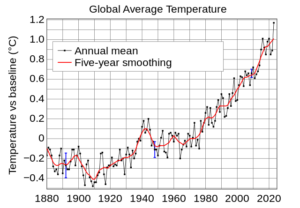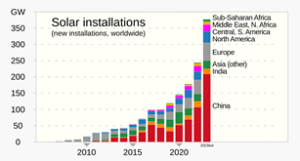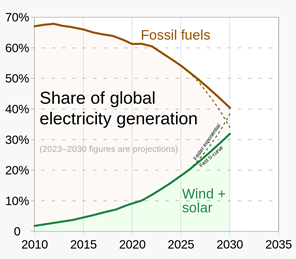Is the Earth entering a new and more dangerous phase in climate change? Where global heating will accelerate instead of slow down? This may be the case, says Jack Marley in The Conversation. For indicators like global heating, sea-level rise, glacier retreat, Antarctic sea ice loss and ocean heat are speeding up. All of these smashed records in 2023 – the hottest year on record by a huge margin.

Record highs
This is substantiated by a new report from the World Meteorological Organization (WMO). This suggests that the rate at which Earth is heating is accelerating. 2023 was the warmest year on record, with global average near-surface temperature at 1.45 ± 0.12°C above the pre-industrial baseline. Already dangerously close to the globally agreed maximally tolerable 1.5oC level. Glaciers suffered the largest loss of ice on record (since 1950), both in western North America and Europe. And Antarctic sea ice extent was by far the lowest on record, 1 million km2 below the previous record year – equivalent to the size of France and Germany combined.
And then, global average sea-surface temperatures were at a record high from April onwards. It is expected that warming will continue – a change which may be irreversible on scales of hundreds to thousands of years. With profound negative repercussions for marine ecosystems and coral reefs. September 2023 was particularly hot globally, much hotter than ever. And the 2023 hurricane season was longer and more severe than ever. With heavy rainfall in many countries. But in other areas like the Iberian peninsula and South America, there was severe drought, with wildfires as a consequence. Glaciers are retreating everywhere in the world, from Greenland to the European Alps. Are such changes here to stay?

A ray of hope
There is, however, a glimmer of hope. Renewable energy capacity additions increased by almost 50% from 2022, for a total of 510 gigawatts (GW) – the highest rate in the past two decades. Nevertheless, the pace of renewable energy is still far below what would be needed to keep global temperature rise below 1.5oC. It still needs to grow by an estimated factor of 6, according to The Conversation.
Climate records broken recently will affect the planet. For instance, in 2022 east Antarctica had the most intense heatwave ever recorded. Temperatures were 40°C higher than average. Fortunately, they stayed below zero. But if the heat wave had come in another season, the results could have been catastrophic. Nevertheless, the effects of such circumstances will be felt for a long time. They may be irreversible. Particularly because such record temperatures will contribute to making the Earth drier (2023 was also the second-driest on record).

Tipping point?
In 2023, some 77 countries experienced their highest average annual temperatures in at least 45 years. Temperature records were shattered from Canada to Brazil, from Spain to Thailand. This was accompanied by abnormally dry weather conditions. Causing crop failures and burning forests. Intensifying multi-year droughts in many regions. And cyclones behaved unexpectedly, far worse than normal; the damage they caused was estimated at more than $45 billion.
And then, there is the danger of the Earth’s system crossing a tipping point; from which there would be no way back to the old state. The climate system may have many potential tipping points; for instance ice sheets disappearing, or dense rainforests becoming much drier. It would be very difficult, maybe impossible, to recover such systems once they go beyond such a tipping point.
No room for complacency
Meanwhile, although renewable energy systems grew very fast last year, so far the energy system as a whole hardly changed. For instance, fossil fuels generated 64% of electricity globally in 1985; in 2022, it was still 61%. Essentially, thermal power plants still dominate the scene. The Conversation asks: how stable are the systems that threaten life on Earth? How fast will the ones that sustain life unravel? This is not the time to be complacent. Instead, we should double our efforts. Unfortunately, the world doesn’t finance sufficiently the adaptation required. Global funding is less than one third of what it should be. So probably, the threat of global warming will be here to stay for some time.
Interesting? Then also read:
Can climate change cause food crises?
Could reforestation stop climate change?
Why didn’t decades of climate concern influence global emissions growth?
